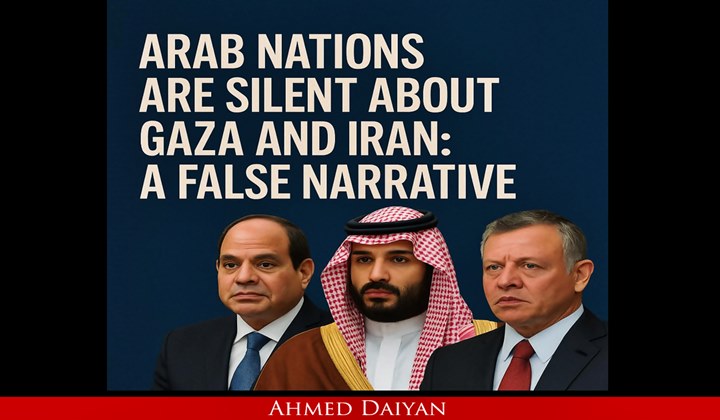■ Ahmed Daiyan ■
For months, commentators have lamented the silence of the Arab regimes over the ongoing genocide in Gaza. Many accuse them of indifference, cowardice, or fear of Western backlash. But this narrative is not just incomplete and dangerously misleading.
Trump, Gaza, and the Ceasefire That Never Was
At the start of Trump’s presidency, there were signs that he might defy the neoconservative-Zionist consensus in Washington. He floated a ceasefire in Gaza and dispatched envoys to engage in talks with Hamas, even sending Adam Bola and Steve Witkov to negotiate a 10-year truce without Israeli knowledge. When these efforts leaked, Trump stood firm, defending the need to pursue American interests, not Israeli demands.
The Israeli establishment panicked. Netanyahu confronted Trump directly. Israeli media and political networks attacked Bola and Witkov, calling them traitors and Qatari agents. Meanwhile, Trump’s base grew increasingly critical of Zionist influence and pushed for de-escalation. Trump listened to his base, not Israel.
But every time there was momentum toward peace in Gaza, Arab regimes intervened to stop it.
We must stop framing Arab inaction as a failure of courage. It is a deliberate policy of betrayal. These regimes aren’t neutral. They are co-architects of Gaza’s isolation and enablers of Israel’s escalation with Iran. Gaza’s cries are not ignored by Arab leaders. They are heard — and silenced. Because the victory of Gaza is a threat to their rule, their priorities, and their future. And that is why they do everything they can to prevent it. The truth is that the leading Arab regimes, particularly Saudi Arabia and the UAE, have not merely failed Gaza. They have actively sided against it. They have undermined ceasefire efforts, pressured foreign powers to deprioritize Gaza, and instead shifted the regional agenda toward a confrontation with Iran, which may well have paved the way for Israel’s military escalation against Tehran.
The Saudi-UAE Axis and the Collapse of the Arab Plan
When King Abdullah of Jordan warned Trump that displacing Palestinians into Jordan and Egypt could destabilize the region, Trump backtracked. He publicly softened his “Gaza Riviera” plan and opened the door to an Arab-led alternative.
Egypt’s Sisi drafted a ceasefire initiative. Hamas tentatively agreed to surrender governance to a new authority, a neutral police force, and regional oversight. But just as this plan was gaining traction, the UAE stepped in to sabotage it.
They demanded the phrase “categorically reject displacement” be changed to “categorically reject forced displacement”. A linguistic sleight of hand that would have legalized the ethnic cleansing of Gaza. When Sisi refused, bin Salman and the UAE boycotted the Arab League summit. Without their participation, Algeria and others pulled out too. The summit collapsed. So did the ceasefire.
From Gaza to Iran: A Shift in Priorities
When Trump later visited Saudi Arabia, many expected Gaza to dominate discussions. Instead, what he heard was Vision 2030, Iran, Iran, Iran. The Saudi crown prince, MBS, offered Trump $1 trillion. Not for Gaza, but for protection against Iran. The UAE countered with $1.4 trillion, demanding American impunity for their actions in Sudan and Libya, and support against Iran.
Qatar, desperate to avoid being sidelined, joined the bidding war and offered Trump a Boeing 747 jet and another $1.4 trillion.
Gaza was barely mentioned
What was Trump supposed to take from this? The Arab world, it seemed, had no red lines on Palestine. The genocide in Gaza was not a diplomatic priority. But Iran was.
So Trump adjusted course
Even European nations like France and the UK who were initially willing to recognize a Palestinian state, reversed positions after seeing Trump return from the region with no Gaza deal. Instead, they floated normalization with Israel.
Arab Complicity in the War on Iran
By flooding Trump with offers and demands centered on Iran, Arab regimes redefined U.S. priorities. They weren’t just passive bystanders in the Gaza crisis but were active lobbyists for shifting American attention away from Gaza and toward Tehran.
When Israel finally attacked Iran, it wasn’t in a vacuum. It followed months of strategic repositioning in the region where Arab capitals paved the way by making clear that genocide in Gaza wouldn’t break their alliances, but Iranian expansion might.
Arab leaders didn’t just abandon Gaza. They incentivized its erasure.
Betrayal, Not Silence
We must stop framing Arab inaction as a failure of courage. It is a deliberate policy of betrayal. These regimes aren’t neutral. They are co-architects of Gaza’s isolation and enablers of Israel’s escalation with Iran.
Gaza’s cries are not ignored by Arab leaders. They are heard — and silenced. Because the victory of Gaza is a threat to their rule, their priorities, and their future. And that is why they do everything they can to prevent it.
The truth is that the leading Arab regimes, particularly Saudi Arabia and the UAE, have not merely failed Gaza. They have actively sided against it. They have undermined ceasefire efforts, pressured foreign powers to deprioritize Gaza, and instead shifted the regional agenda toward a confrontation with Iran, which may well have paved the way for Israel’s military escalation against Tehran.

